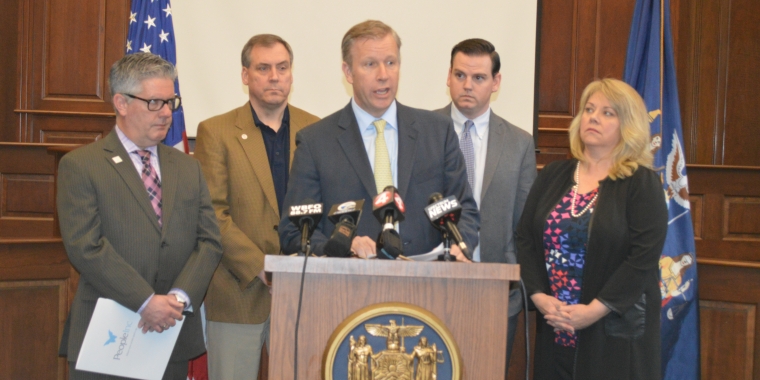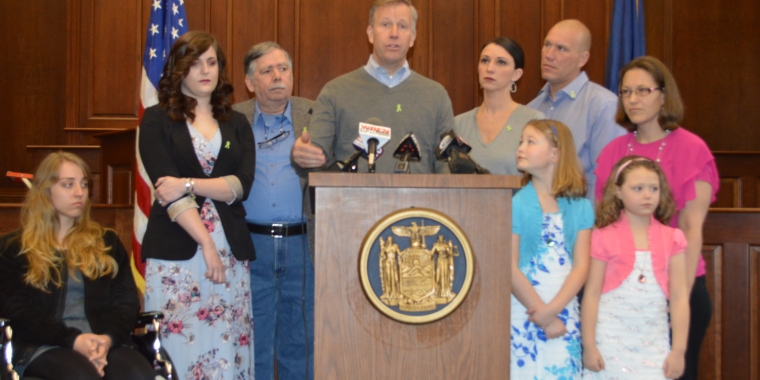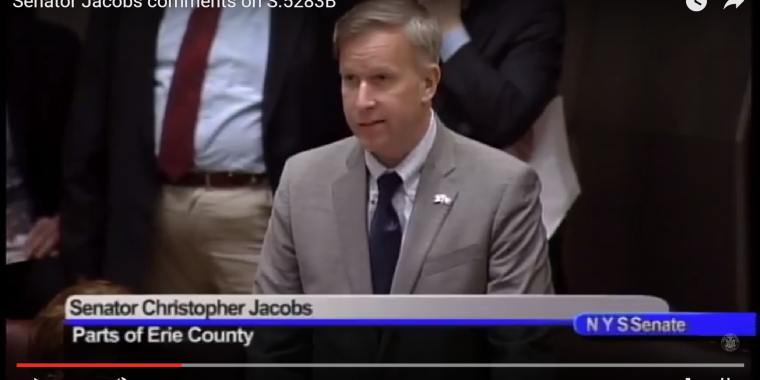
Senator Jacobs, Business & Advocacy Groups Hail Workers' Compensation Reform
Senator Jacobs
April 12, 2017
-
ISSUE:
- State budget
- Workers' Comp Reform

(Buffalo, NY) – New York State Senator Chris Jacobs (60th SD) announced the successful passage of a Senate led Workers’ Compensation Reform package that is expected to produce hundreds of millions of dollars in employer savings across New York while also improving protections for injured workers.
“The tremendous burden that New York’s Workers’ Compensation system has placed on businesses, local governments and not-for-profits has been a roadblock to growing our economy and put our region and our state at a huge competitive disadvantage,” said Senator Jacobs. “These reforms will make Buffalo and Western New York a more attractive place to do business, and help keep the revitalization of our regional economy going forward,” Jacobs added.
“New York’s high Workers’ Compensation costs are challenging employers’ ability to compete, reward employees and create jobs,” said Dottie Gallagher-Cohen, President & CEO of the Buffalo Niagara Partnership. “Achieving meaningful Workers’ Compensation reform and real costs savings for employers was one of our top budget priorities this year. I want to thank Senator Jacobs and his Senate Republican Conference colleagues for pushing so hard with us on this critical issue. Our fight is far from over and more must be done to reduce program costs while providing the care and compensation injured workers deserve.”
"High Workers’ Compensation costs serve as a significant drag on the Upstate economy. They are a hidden tax on every employer -- large companies, small businesses, not-for-profits, schools and local governments -- contributing to Upstate job loss, population decline and our high local taxes,” said Greg Biryla, Executive Director of Unshackle Upstate. “The recently-enacted state budget reforms the state’s Workers’ Compensation system, brings it in line with modern medical science and delivers savings to employers across New York State. We thank Senator Jacobs and his colleagues in the Senate Republican Conference for fighting for Upstate taxpayers, and we look forward to continued progress on this and other key economic issues.”
There are four components to the Workers’ Compensation Reform package approved in the State Budget. They are:
Reforming Temporary Benefit Timeframes – A new general rule instituting 2.5 years for an employee to claim temporary benefits. This change alone is expected to reduce employer contributions approximately $350 million each year.
New Medical Impairment Guidelines for Scheduled Loss of Use Awards – The Workers’ Compensation Board is being required to issue new medical impairment guidelines by the end of this year to reflect advances in modern medicine that produce better patient outcomes. These new guideline are also expected to save employers hundreds of millions of dollars annually.
Creation of a Prescription Drug Formulary – Doctors will be able to consult a new, comprehensive list of high quality, cost-effective medications pre-approved for injured workers. This will include non-preferred drugs that can be prescribed with prior approval to ensure injured workers get the most appropriate care.
Rebates for Current Year’s Premiums – Because employers are already paying premiums based on 2017 estimates, year-end rebates will be issued once administrators calculate final year-end savings.
“While I am pleased by the action the New York State legislature took to enact worker's compensation reform, New York remains one of the highest cost states in the country,” said Try-It Distributing President & COO Paul Vukelic. “This latest reform is a good start to real change and making New York State more affordable and business friendly in the future.”
"The issue of workers compensation costs doesn't affect just the private sector, it means high costs for government funded nonprofits as well that receive taxpayer dollars," said Kevin Horrigan Associate Vice President of People Inc. "We care for thousands of people that have high physical needs. This new reform will ensure our staff are still protected while saving workers compensation costs to our agency and nonprofits like ours. We appreciate the leadership of Senator Jacobs on this issue and the advocacy of the Buffalo Niagara Partnership and Unshackle Upstate," said Horrigan.
Workers’ Compensation costs in New York State approach $10 billion annually. The approximate savings from the reforms enacted in the budget are estimated to reduce those costs by roughly $700 million, which in turn would translate into a potential savings of 7% annually for employers across the state.
At the same time, the safety net for seriously injured workers who qualify to apply for extended permanent benefits will include workers determined to be more than 75% injured. Also, a new “Safety Valve” will allow workers who can demonstrate continued need for temporary benefits beyond the 2.5-year rule to apply to the State Workers’ Compensation Board for an extension.
“Reforming the system is a critical element of making our state more affordable for all public and private employers,” said Jacobs. “The reforms now enacted are a good start, and prove that we can reduce the costs of overly burdensome mandates while improving the outcomes and services being delivered to injured workers,” Jacobs concluded.
Share this Article or Press Release
Newsroom
Go to Newsroom

